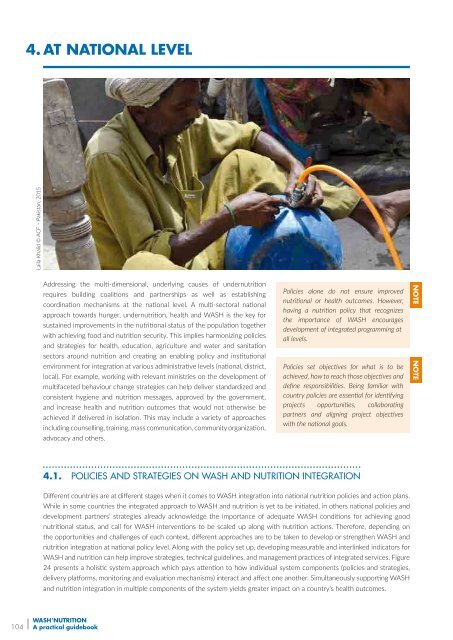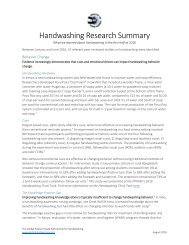WASH’ Nutrition
manuel_wash_nutrition_online
manuel_wash_nutrition_online
Create successful ePaper yourself
Turn your PDF publications into a flip-book with our unique Google optimized e-Paper software.
4. at national level<br />
Laila Khalid © ACF – Pakistan, 2015<br />
Addressing the multi-dimensional, underlying causes of undernutrition<br />
requires building coalitions and partnerships as well as establishing<br />
coordination mechanisms at the national level. A multi-sectoral national<br />
approach towards hunger, undernutrition, health and WASH is the key for<br />
sustained improvements in the nutritional status of the population together<br />
with achieving food and nutrition security. This implies harmonizing policies<br />
and strategies for health, education, agriculture and water and sanitation<br />
sectors around nutrition and creating an enabling policy and institutional<br />
environment for integration at various administrative levels (national, district,<br />
local). For example, working with relevant ministries on the development of<br />
multifaceted behaviour change strategies can help deliver standardized and<br />
consistent hygiene and nutrition messages, approved by the government,<br />
and increase health and nutrition outcomes that would not otherwise be<br />
achieved if delivered in isolation. This may include a variety of approaches<br />
including counselling, training, mass communication, community organization,<br />
advocacy and others.<br />
Policies alone do not ensure improved<br />
nutritional or health outcomes. However,<br />
having a nutrition policy that recognizes<br />
the importance of WASH encourages<br />
development of integrated programming at<br />
all levels.<br />
Policies set objectives for what is to be<br />
achieved, how to reach those objectives and<br />
define responsibilities. Being familiar with<br />
country policies are essential for identifying<br />
projects opportunities, collaborating<br />
partners and aligning project objectives<br />
with the national goals.<br />
NOTE<br />
NOTE<br />
4.1. policies and strategies on WASH and nutrition integration<br />
Different countries are at different stages when it comes to WASH integration into national nutrition policies and action plans.<br />
While in some countries the integrated approach to WASH and nutrition is yet to be initiated, in others national policies and<br />
development partners’ strategies already acknowledge the importance of adequate WASH conditions for achieving good<br />
nutritional status, and call for WASH interventions to be scaled up along with nutrition actions. Therefore, depending on<br />
the opportunities and challenges of each context, different approaches are to be taken to develop or strengthen WASH and<br />
nutrition integration at national policy level. Along with the policy set up, developing measurable and interlinked indicators for<br />
WASH and nutrition can help improve strategies, technical guidelines, and management practices of integrated services. Figure<br />
24 presents a holistic system approach which pays attention to how individual system components (policies and strategies,<br />
delivery platforms, monitoring and evaluation mechanisms) interact and affect one another. Simultaneously supporting WASH<br />
and nutrition integration in multiple components of the system yields greater impact on a country’s health outcomes.<br />
104<br />
<strong>WASH’</strong><strong>Nutrition</strong><br />
A practical guidebook



